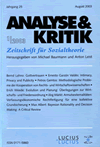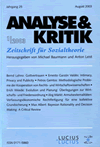Suchergebnisse
"Christoph Henning"
Titel: Comment on Hermann Kocyba: The Regime of Esteem, or Recognition as Affirmation
Autor: Christoph Henning
Seite: 261-269
Abstract: This comment on Kocyba's article discusses both his economic and moral assumptions, arguing that the shift from industrial capitalism towards a 'new spirit' of more autonomous forms of work is not captured by Kocyba's comparison between producing things alone and creating services together. Consequently, the main problem is not, as Kocyba believes, the determination of an individual's share in the (intangible) product, but the competitive mindset of this new spirit, which has many undesired consequences. Concerning the 'moral presuppositions' it is argued that the questionable self-restriction to 'immanent norms' induces a strong affirmative tendency which is at odds with Kocyba's critical aspirations. The idea that critical theory can only refer to norms which are already institutionalized needs to be dropped in order to revive the critical dimension. It is argued that Kocyba is already half way there and needs to make this break more explicit.
Titel: Liberalism, Perfectionism and Workfare
Autor: Christoph Henning
Seite: 159-180
Abstract: Recent welfare reform has resulted in new work requirements for welfare recipients. These measures need to be justified, as they impair recipients’ freedom. This paper first repudiates economic justifications for these developments and argues that the dominant justification is perfectionist. But unlike workfare, perfectionism is not necessarily paternalistic. The second part of the paper outlines a liberal perfectionism which allows only for autonomy-enhancing politics. Though even such autonomy-enhancing politics cannot be made obligatory. The last section concludes that workfare’s paternalism cannot be attributed to perfectionist justifications, but rather stems from the narrow philosophy of work that is applied. The idea that enforced wage labour is a reliable tool for inducing autonomy is refuted. In the end, workfare needs to be rejected, as it is based on assumptions that are mistaken both normatively and empirically.

Work and Cooperation
2011 (33) Heft 1
Editorial
Both in social theories with the aim of looking into the creative core of society as well as in everyday politics, two intuitions often supplement each other. The first intuition, empirico-analytical, views common organization of work and production as being the very aim of society, and other parts of society being explicable from this. A second intuition, ethical or moral, holds the sphere of work to be the central site for diagnoses of a society's inherent justice. Both intuitions not only con...

Work and Social Justice
2009 (31) Heft 1
Guest-Editor: Carsten Köllmann
Editorial
The labour market is among the most contested fields of political argument and conflict in our time. Public criticism of increasing wage inequalities and especially of excessive management pay is, notwithstanding its popularity, only a symptom of more fundamental changes going on in the labour market and in society at large. The conditions and the very meaning of work rank high on the agenda of Western societies. Persistent mass unemployment, coupled with an increasing number of working poor, co...